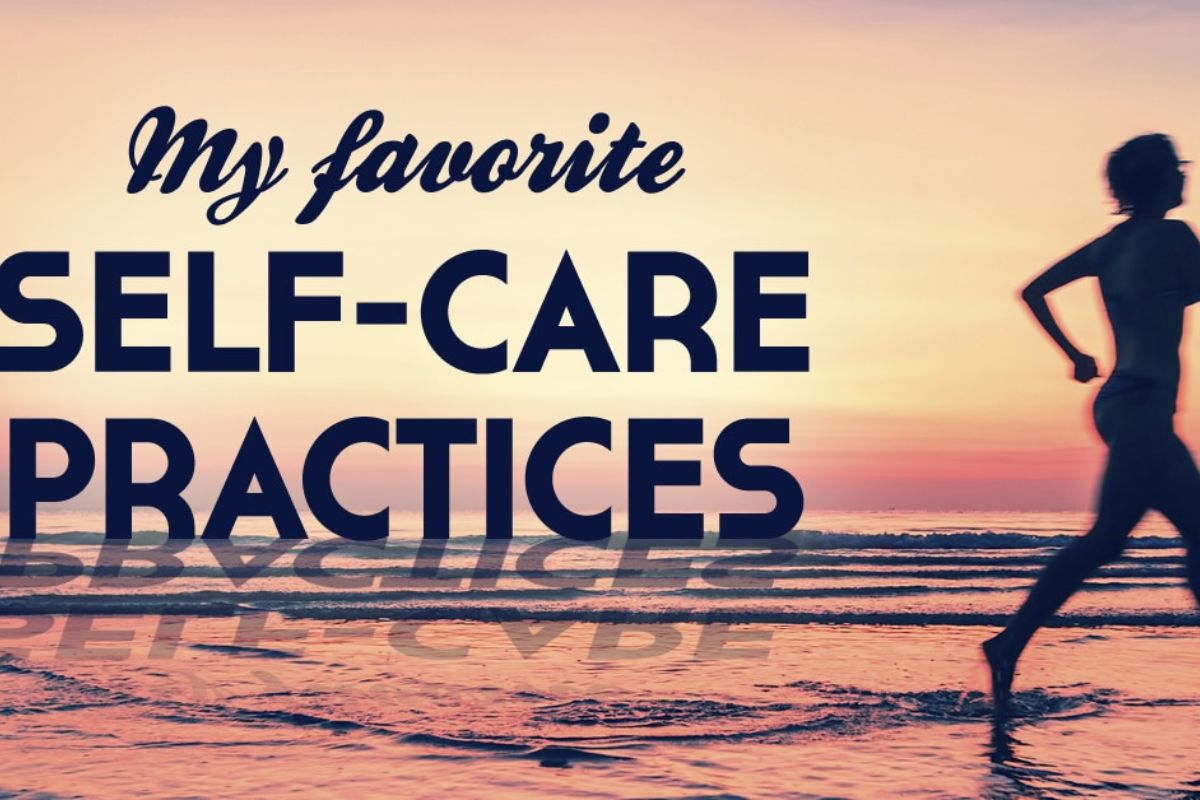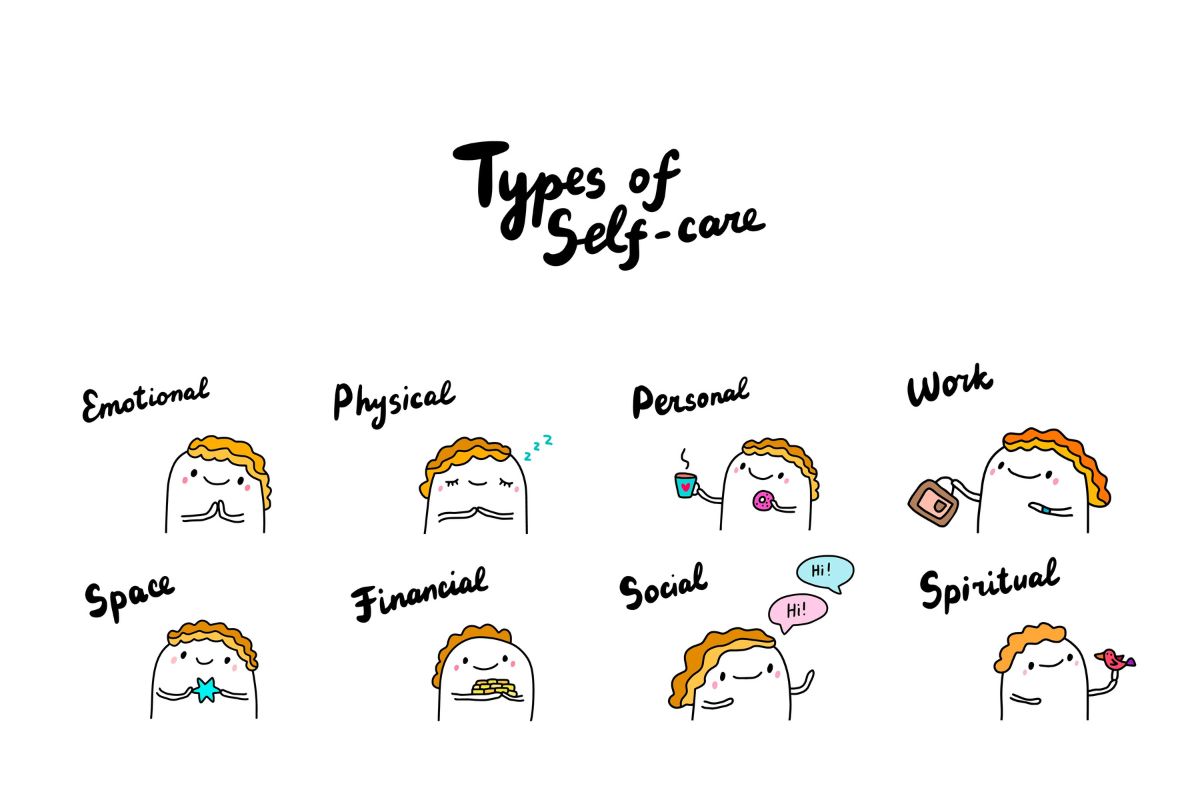Self-care is crucial for maintaining mental health and well-being. Prioritize activities that promote relaxation, such as meditation, deep breathing exercises, or spending time in nature. Establishing a consistent sleep schedule can also improve mood and cognitive function. Additionally, maintain a balanced diet with plenty of fruits, vegetables, and whole grains to nourish your body and mind. Engage in regular physical activity, whether it’s going for a walk, practicing yoga, or dancing to your favorite music, as exercise releases endorphins and reduces stress. Setting boundaries and learning to say no to excessive commitments is essential for preserving energy and avoiding burnout. Cultivate meaningful relationships with friends and family to foster social support and connection. Take breaks from technology and media to reduce overwhelm and promote mindfulness. Lastly, don’t hesitate to seek professional help if needed, as therapy can provide valuable support and coping strategies. Overall, prioritize self-care practices that nourish your mind, body, and soul to enhance your mental health and well-being.
Self-care practices.

Self-care practices are essential for maintaining mental health and overall well-being. Here are some effective strategies:
Regular Exercise.
Regular exercise is vital for maintaining overall health and well-being. Engaging in physical activity on a consistent basis offers numerous benefits for both the body and mind. Firstly, it helps in managing weight by burning calories and increasing metabolism, reducing the risk of obesity and related health conditions such as diabetes and heart disease.
Exercise also strengthens muscles and improves flexibility, enhancing physical performance and reducing the likelihood of injuries. Additionally, regular physical activity contributes to better cardiovascular health by improving blood circulation and lowering blood pressure and cholesterol levels.
Furthermore, exercise is crucial for mental health, as it releases endorphins that promote feelings of happiness and reduces stress, anxiety, and depression. It also enhances cognitive function and memory, leading to better focus and productivity.
Establishing a routine of regular exercise doesn’t necessarily require intense workouts; even moderate activities like walking, swimming, or yoga can yield significant benefits. The key is consistency and finding activities that one enjoys and can incorporate into their daily life. in conclusion, making exercise a regular part of one’s lifestyle is essential for achieving and maintaining optimal health, both physically and mentally.
Healthy Eating Habits:

Healthy eating habits are essential for maintaining overall well-being and preventing various diseases. Here are some key principles to follow:
Balance: Include a variety of foods from all food groups in your diet, such as fruits, vegetables, whole grains, lean proteins, and healthy fats. This ensures you get a wide range of nutrients your body needs.
Portion control: Pay attention to portion sizes to avoid overeating, which can lead to weight gain and other health issues. Use smaller plates and bowls to help control portions.
Eat regularly: Aim to eat small, balanced meals and snacks throughout the day to keep your energy levels stable and prevent overeating at main meals.
Limit processed foods: Processed foods often contain unhealthy additives, excess salt, and sugar. Opt for whole, unprocessed foods whenever possible.
Stay hydrated: Drink plenty of water throughout the day to maintain proper hydration. Limit sugary drinks and alcohol.
Mindful eating: Pay attention to hunger and fullness cues, and eat slowly to savor your food. This can help prevent overeating and promote better digestion.
Plan ahead: Plan your meals and snacks in advance to ensure you have healthy options available and avoid making unhealthy choices out of convenience.
By incorporating these habits into your lifestyle, you can improve your overall health and well-being.
Adequate Sleep:
Here are some key points to consider:
Adequate sleep is crucial for overall health and well-being.

Quantity: Aim for 7-9 hours of sleep per night, as recommended for adults by the National Sleep Foundation. Children and teenagers typically need more sleep, with recommendations varying by age.
Focus: Focus on improving the quality of your sleep by creating a conducive sleep environment. This includes a comfortable mattress and pillows, a cool and dark room, and minimizing noise and distractions.
Consistency: Try to maintain a consistent sleep schedule by going to bed and waking up at the same time each day, even on weekends. This helps regulate your body’s internal clock and improve sleep quality.
Avoid stimulants: Limit the consumption of caffeine, nicotine, and alcohol, especially in the hours leading up to bedtime, as these substances can interfere with your ability to fall asleep and stay asleep.
Relaxation techniques: Incorporate relaxation techniques such as deep breathing, meditation, or gentle stretching before bedtime to help calm your mind and body and prepare for sleep.
Limit screen time: Avoid electronic devices such as smartphones, computers, and televisions at least an hour before bedtime, as the blue light emitted from screens can disrupt your sleep-wake cycle.
Seek help if needed: If you consistently struggle with sleep problems such as insomnia or sleep apnea, consult a healthcare professional for evaluation and treatment options.
By prioritizing adequate sleep and implementing these strategies, you can improve your sleep quality and overall health.
Mindfulness and Meditation:
Mindfulness and meditation are powerful practices that promote mental well-being and overall health. Here are some key aspects to consider:

Mindfulness:
Mindfulness involves paying attention to the present moment without judgment. It’s about being fully present in each moment, aware of your thoughts, feelings, sensations, and surroundings. Practicing mindfulness can help reduce stress, anxiety, and depression, while also improving focus, concentration, and emotional regulation.
Meditation:
Meditation is a technique that involves training the mind to achieve a state of relaxation and heightened awareness. There are various forms of meditation, including mindfulness meditation, loving-kindness meditation, and guided imagery. Meditation can help calm the mind, promote inner peace, and cultivate a greater sense of self-awareness and compassion.
Benefits:
Both mindfulness and meditation offer numerous benefits for mental and physical health. Research has shown that regular practice can reduce stress, improve sleep quality, boost immune function, lower blood pressure, and enhance overall well-being. Additionally, mindfulness and meditation can help cultivate a greater sense of happiness, resilience, and compassion towards oneself and others.
Practice:
Incorporating mindfulness and meditation into your daily routine doesn’t have to be complicated. You can start with just a few minutes each day and gradually increase the duration as you become more comfortable. There are many resources available, including guided meditation apps, online courses, and mindfulness exercises that can help you get started and stay motivated.
Integration:
Beyond formal meditation sessions, you can also incorporate mindfulness into your daily activities, such as eating, walking, or even washing dishes. By bringing awareness to your everyday experiences, you can cultivate a greater sense of presence and appreciation for the simple moments of life.
Overall, mindfulness and meditation offer powerful tools for cultivating mental clarity, emotional resilience, and overall well-being. By incorporating these practices into your life, you can experience greater peace, joy, and fulfillment.
Setting Boundaries 6 Connection with Others.

Setting boundaries in relationships is essential for maintaining healthy connections with others. Communicate your needs, limits, and expectations clearly and respectfully. Boundaries help establishmutual respect and prevent feelings of resentment or overwhelm. It’s okay to say no and prioritize your well-being. Boundaries foster trust and deepen relationships by promoting open and honest communication. Remember, setting boundaries is an act of self-care and empowerment, strengthening your connections while honoring your own needs.
Hobbies and Leisure Activities.
Hobbies and leisure activities play a vital role in enhancing our overall well-being and enriching our lives with joy and fulfillment. These pursuits offer a break from the routine of daily life, providing opportunities for relaxation, creativity, and personal growth.
Engaging in hobbies allows individuals to explore their interests and passions outside of work or other obligations. Whether it’s painting, gardening, playing a musical instrument, or cooking, hobbies provide an outlet for self-expression and creativity. They offer a sense of accomplishment and satisfaction as individuals develop new skills and pursue their interests.

Moreover, hobbies and leisure activities contribute to mental and emotional well-being by reducing stress and promoting relaxation. Immersing oneself in a hobby can create a state of flow, where time seems to stand still, and individuals experience deep concentration and enjoyment. This state of flow is associated with increased happiness and a sense of fulfillment.
Additionally, hobbies often provide opportunities for social connection and community involvement. Whether it’s joining a club, participating in group activities, or attending classes and workshops, hobbies can facilitate meaningful interactions with others who share similar interests. These social connections foster a sense of belonging and can lead to lasting friendships.
Overall, incorporating hobbies and leisure activities into our lives is essential for maintaining a healthy work-life balance and nurturing our overall well-being. By dedicating time to activities we enjoy, we can cultivate a more fulfilling and meaningful life.
Seeking Professional and perfocial Support.
Seeking professional support is a crucial step in addressing various challenges and improving one’s overall well-being. Whether facing mental health issues, relationship difficulties, career concerns, or personal struggles, seeking help from qualified professionals can provide valuable guidance, support, and resources.

Therapists, counselors, psychologists, and psychiatrists are trained to help individuals navigate through emotional, psychological, and interpersonal challenges. They offer a safe and confidential space for individuals to explore their thoughts, feelings, and experiences, helping them gain insight, develop coping strategies, and work towards positive change.
In addition to mental health professionals, seeking support from other professionals such as career coaches, financial advisors, or legal experts can also be beneficial in addressing specific areas of concern and achieving personal or professional goals.
It’s important to recognize that seeking professional support is not a sign of weakness but rather a proactive step towards self-care and growth. By reaching out for help, individuals demonstrate courage, resilience, and a commitment to their own well-being.
Furthermore, professional support can provide a sense of validation, empowerment, and hope, reminding individuals that they are not alone in their struggles and that help is available. Whether through individual therapy, group counseling, or other forms of support, seeking professional assistance can lead to positive outcomes and a renewed sense of direction and purpose in life.
Why You Need a Self-Care Routine?
A self-care routine is essential for maintaining physical, emotional, and mental well-being in today’s fast-paced world. It allows individuals to prioritize their own needs and recharge their batteries, preventing burnout and improving overall quality of life. A consistent self-care routine can help reduce stress, increase resilience, and enhance self-esteem. By dedicating time to activities that promote relaxation, self-reflection, and personal growth, individuals can better manage the demands of daily life and cultivate a greater sense of balance and fulfillment. Additionally, self-care fosters a deeper connection with oneself, promoting self-awareness and self-compassion. Ultimately, prioritizing self-care is an investment in one’s long-term health and happiness, enabling individuals to show up as their best selves in all aspects of life.
The Different Types of Self-Care.
Self-care encompasses various practices that prioritize one’s physical, emotional, and mental well-being. Some types of self-care include:

Physical self-care: Activities that focus on maintaining physical health, such as exercising regularly, eating nutritious foods, getting enough sleep, and attending medical appointments.
Emotional self-care: Practices that nurture emotional well-being, such as expressing emotions, setting boundaries, practicing self-compassion, engaging in activities that bring joy, and seeking support from friends, family, or mental health professionals.
Mental self-care: Strategies to support mental health, such as practicing mindfulness and meditation, engaging in hobbies or creative outlets, setting realistic goals, managing stress effectively, and seeking mental stimulation through learning or problem-solving activities.
Social self-care: Actions that foster healthy relationships and social connections, such as spending time with loved ones, participating in community activities, setting boundaries in relationships, and seeking out supportive friendships.
By incorporating various types of self-care into their lives, individuals can maintain a holistic approach to well-being and better cope with the challenges of daily life.
How to Start a Self-Care Routine.
To start a self-care routine, begin by identifying activities that bring you joy and promote well-being. Set aside dedicated time each day or week for self-care activities. Start small and gradually add more practices as you become comfortable. Experiment with different activities such as meditation, exercise, journaling, or spending time in nature. Prioritize self-care by scheduling it into your routine and treating it as non-negotiable time for yourself. Remember to be flexible and adjust your routine as needed. Most importantly, be kind to yourself and recognize that self-care is essential for your overall health and happiness.
Frequently asked questions.
What are your thoughts Self-Care?
Self-care is vital for maintaining balance and well-being. It’s not selfish; it’s necessary for optimal functioning. Prioritizing self-care nurtures mental, emotional, and physical health. It’s about recognizing and honoring our needs, setting boundaries, and engaging in activities that replenish and rejuvenate us.
What are some good self-care practices?
Some good self-care practices include mindfulness meditation, regular exercise, adequate sleep, healthy eating, spending time in nature, journaling, practicing gratitude, setting boundaries, engaging in hobbies, seeking support when needed, and prioritizing activities that bring joy and relaxation.
What is normal self-care?
Normal self-care encompasses everyday activities and habits that contribute to maintaining one’s physical, mental, and emotional well-being. This includes practices like personal hygiene, healthy eating, regular exercise, adequate sleep, managing stress, and seeking social support. These routines vary from person to person but are essential for overall health.
How can I practice self love?
Practicing self-love involves treating yourself with kindness, compassion, and acceptance. Focus on positive self-talk, set boundaries to protect your well-being, prioritize self-care activities, forgive yourself for mistakes, celebrate your accomplishments, and surround yourself with supportive people who uplift and encourage you to be your authentic self.
